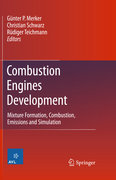
Combustion engines development: carburation, mixture formation, combustion, emission and simulation
Merker, Günter P.
Schwarz, Christian
Combustion Engines Development nowadays is based on simulation, not only of the transient reaction of vehicles or of the complete driveshaft, but also of the highly unsteady processes in the carburation process and the combustion chamber of an engine. Different physical and chemical approaches are described toshow the potentials and limits of the models used for simulation. - understandable and actual presentation of the simulation of combustion engine processes- practical guidelines, rules and recommendations INDICE: Abbreviations and symbols.- Part A: Foundations of thermodynamics and chemistry.- Introduction.- Reciprocating engine.- Combustion diagnostic.- Engine comustion.- Reaction kinetics.- Pollutant formation.- Part B: Total process simulation.- Calculation of the working process.- Charging of combustion engines.- Exhaust aftertreatment systems.- Total process analysis.- Part C: Simulation of combustion and charging.- Phenomenological combustion models.- Three-dimensional flow fields.- Simulation of fuel injection processes.- Simulation of combustion.- 3D-Simulation of the charging process.
- ISBN: 978-3-642-02951-6
- Editorial: Springer
- Encuadernacion: Cartoné
- Páginas: 650
- Fecha Publicación: 01/05/2010
- Nº Volúmenes: 1
- Idioma: Inglés
